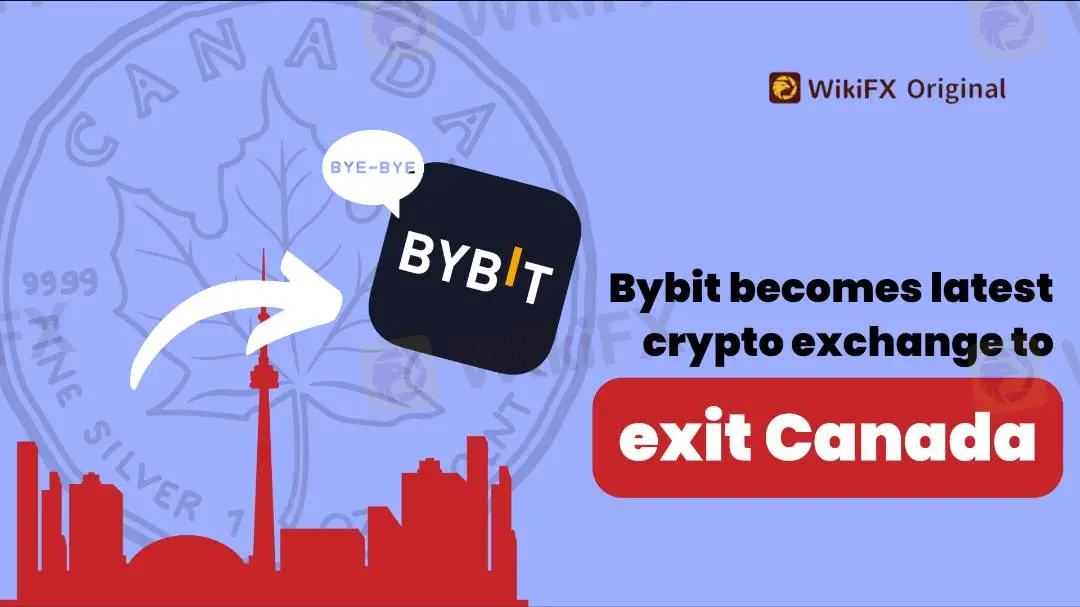简体中文
繁體中文
English
Pусский
日本語
ภาษาไทย
Tiếng Việt
Bahasa Indonesia
Español
हिन्दी
Filippiiniläinen
Français
Deutsch
Português
Türkçe
한국어
العربية
Bybit Exits Canadian Market Due to Regulatory Reasons
Abstract:Bybit, a cryptocurrency exchange, has announced that starting from May 31, it will no longer accept new account registrations from Canadian residents or citizens. After the end of July this year, Canadian users will be unable to increase their positions and will only be able to withdraw funds or reduce their positions. This decision comes in response to the regulatory requirements in Canada. Recently, Binance also announced its exit from the Canadian market.

On May 30, Bybit, a cryptocurrency exchange, announced its intention to temporarily suspend all services and products offered in Canada until further notice, citing regulatory developments within the country. Consequently, starting from May 31, individuals who are Canadian nationals or residents will no longer have the ability to create new accounts on the Bybit platform.
“In response to the evolving regulatory landscape, Bybit has made the challenging yet imperative decision to temporarily pause the availability of our comprehensive range of products and services in Canada.”
Services to end
Existing customers of Bybit will retain access to the exchange's services and products until July 31, after which the platform will cease support for all its offerings in Canada. However, customers will no longer be able to increase their positions beyond this deadline. Despite this limitation, they will still have full access to their funds and the ability to withdraw them or reduce their existing positions.
Bybit has also provided Canadian customers with a winding-down period until September 30. It is crucial for customers to close their positions during this time frame, as any failure to do so will result in the automatic liquidation of all open positions in margin products and derivative contracts.
The Canadian exodus
Following the implementation of new regulations in February, the Canadian crypto industry witnessed a series of exchanges exiting the market. Bybit is the latest exchange to make this decision, as it faced the ultimatum to comply with the regulatory requirements or cease operations in the country.
Under the new regulations, exchanges are prohibited from offering leverage, including margin or credit, and are also restricted from facilitating the purchase or deposit of stablecoins without prior approval from regulators. These restrictions on stablecoins and leverage services have become the main catalyst for the departure of exchanges from Canada.
In a similar move, Binance also announced the suspension of its services for Canadian customers, citing the challenging regulatory landscape that made operating in the country untenable. Binance expressed efforts to explore alternative options to safeguard its Canadian users but concluded that no viable solutions were available.
Binance stated:
“Due to new guidelines concerning stablecoins and investor limits provided to crypto exchanges, it is no longer feasible for Binance to continue its operations in the Canadian market. Despite our best efforts to find alternative measures for the protection of our Canadian users, it has become evident that viable options do not exist.”
In March, OKX joined the list of exchanges temporarily halting their operations in the Canadian market, followed by dydx and Paxos in April, who also made the decision to withdraw their services.
All three exchanges attributed their actions to the introduction of new regulatory guidelines, which became the primary factor influencing their choices.
In contrast, some exchanges have chosen a different path by embracing regulatory measures and expressing their support for increased regulation within the crypto sector, even if it imposes certain limitations.
Coinbase and Kraken have reaffirmed their commitment to continue operating in Canada and have expressed their willingness to comply with the new regulatory framework, acknowledging the challenges it may present.

Disclaimer:
The views in this article only represent the author's personal views, and do not constitute investment advice on this platform. This platform does not guarantee the accuracy, completeness and timeliness of the information in the article, and will not be liable for any loss caused by the use of or reliance on the information in the article.
Read more

PayPal Expands PYUSD Transfers to Ethereum and Solana
PayPal's PYUSD stablecoin can now transfer across Ethereum and Solana, enhancing flexibility for users through a LayerZero cross-chain integration.

Crypto Scammer Pleads Guilty in $73 Million “Pig Butchering” Fraud
The scammer behind a $73 million pig butchering scheme has pleaded guilty to defrauding victims through fake cryptocurrency investments.

Influencer-Led $232M Crypto Scam Exposed in South Korea
South Korean authorities recently dismantled a large-scale cryptocurrency scam, allegedly orchestrated by a popular YouTuber referred to as Mr. A, which misled over 15,000 investors and amassed nearly 325.6 billion Korean won (approximately $232.7 million USD).

Robinhood Reinstates SOL and ADA Amid Expanding Crypto Offerings
Robinhood brings back SOL and ADA for U.S. investors after delisting due to SEC concerns, adding XRP and PEPE in an expanded lineup of 19 cryptocurrencies.
WikiFX Broker
Latest News
JUST Finance and UBX Launch Multi-Currency Stablecoin Exchange
XM Revamps Website with Sleek Design and App Focus
Global Shift in Cryptocurrency Taxation: Italy and Denmark Chart New Paths
Webull Introduces 24/5 Overnight Trading to Extend U.S. Market Access
TradingView & Mexico’s Uni. Partnership, to Enhance Financial Education
Something You Need to Know About SogoTrade
eToro Launches Global-Edge Smart Portfolio: A Balanced Approach to Growth and Stability
Darwinex advises traders to update MT4 & 5
Revolut X Expands Crypto Exchange Across Europe, Targeting Pro Traders
Broker Review: Is Exnova Legit?
Currency Calculator


